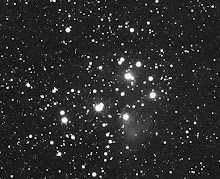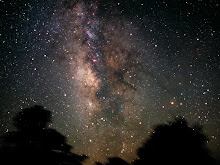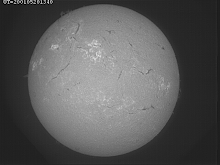The most significant single detail about the U.S. economy is probably that it is quiet. It is quiet in an important way: it is so quiet that it can be described in terms of things like the Boltzmann constant, the noise figure, the thermal noise and other technical terms. The quiet means that something noisy, energetic and chaotic has become silent and inactive.
Moreover, this change is one of those permanent kinds of change from which can emerge many solid, clear distinctions between
I. millions of years of ancient history
and
II. millions of years of future.
The big change was attainment of the Moon, and the related, top gravy icing-on- the-cake orbital space flight around the Earth, plus instrumented probes of the planets. Those things changed everything. From personal memory alone, I recall being with my parents and grandparents in the West Seattle Alki beach area one summer evening in 1948. As it was becoming dark, we went outside and looked at the full moon. We had a pair of binoculars. My parents asked several times if I could see "the man in the Moon" It never occurred to me to imagine a person actually standing there; I could only see the well known shapes of light and shadow that were called a face. It was okay, though.
Our grandfather told us of China, and how it was far away across the ocean. He described different people and added some anecdotes. Mostly, I could see that the world was dark and, it seemed then, flat. I could only contrast that later, more like now, with the modern sense of its being round like a ball, and of the Moon being round in the same way. The world was dark and flat and local; Issaquah was far away. Everyplace else was unknown, even if I'd been there, whether it was on the Earth or not. That was then, of course.
Since Sputnik, Apollo, Skylab, Soyuz and the International Space Station everything has changed. The world's millions of years, once all in the past and full of dinosaurs, is now entirely distinct from emerging concepts of the future. The future stretches, not endlessly so much as in detail before us, yet there is no limit to the horizons of time in the future, for those go on, and on forever. It is merely true that the future's familiar, predictable scales are becoming true, clear, and increasingly certain, while unknowns about the commensurate time are becoming smaller in magnitude. Instinct and nature are becoming more confident of the future and the future is all on Earth, for a considerable time to come.
That's not bad, but like a small town in an untroubled country, it is either already neat as a pin. You better stay out of the way of the business of putting things in order, for that is the business of the entire world now. Earth is a conscious entity with its own instincts for its health, confidence, certainty, and a large range of values that were until recently concepts only in the views of individual human beings, families or sometimes nations. Oh, the nation-but not the entire Earth? Earth is gaining a globally collective sense of its own existence, its value to itself and in the universe, and its ability to fend for itself against both external and internal threats.
These senses come from the primitive organism's ability to fend both interior and exterior threats. Those are threats such as disease pathogens (viruses, germs and parasites) and predators (lions, tigers and bears). Human society of course invented new kinds of threats, and these are fortunately, diminishing in magnitude; their appearance was mostly in the form of wars.
We have imagined some kinds of threat (space aliens) that seem to be increasingly unlikely, and not anticipatable in any sensible way. Our concern about them has resulted in a vast theater that probably in some obscure movie depicted more closely than we know, what eventually will happen, yet for a long time to come, it appears that no space aliens will be encountered, discovered or detected.
Eventually, the most recent gleaning indicates, a gradually improving concept of extraterrestrial life will emerge from increasingly detailed understanding of the atomic, molecular, and chemical activity between and in other star systems. The concept comes into better focus through a time of several centuries or more. Just how long is not clear. Even the conclusions are not clear, for the vision trailed off with ONLY an indication that the concept of extraterrestrial life is, someday, becoming increasingly clear. And ET is not here, not soon, not yet. Earth is the only life among the stars for a good long time yet.
This would be similar to the way in which Native American prophesy resulted in an assortment of stories that made it possible for them to say to some of the European settlers, "Our ancestors told us that you would come." Prophesy has always been useful that way, since human beings were first living in tents and thinking about, considering, what would come snooping around tomorrow. And what it would be looking for - a place, food, mate, competitor?
For now, apparently for several centuries, there won't be any visitors. We won't find any places within reach have life on them, although we already recognize the atomic and molecular basic constituents of life do exist in other places both in the solar system and at other star systems. Budgets and interest permitting, or urgency requiring, we are destined to explore the solar system, and it may be found possible to start life on Mars - that's still up in the air. It will have to be very tough and, and whether simple and primitive, or intricate and complex, it will have to be of very sophisticated adaptation before it is successful.
One can conclude almost nothing more: so?
"So?" is about all one can say. The future is becoming more explicable. At the present time, security precautions in the industrial market world, particularly the United States, are heavily invested in the possibility of threats coming from impossible-to-predict-even-in-principle unknown sources, because the idea of human terrorists native to planet Earth, and space aliens from unknown stars, are all mixed up together. Meanwhile, one is a fact and real possibility, and the other only haunts our imaginations. That's why whenever anything suspicious appears that is noticed by security forces in the United States, the whole top of the stadium blows off and the world is suddenly exposed to the moral vacuum of outer space without any particular concern for common sense.
Scientists were always equated with imaginary space aliens and vice versa. There are no space aliens.
Space aliens only exist in the vacuum of outer space and the reaches therein of imagination untrammeled by common sense. Imagination untrammeled needs better government.
Ideas of criminals, terrorists or more hypothetical space aliens are images always on file, which resulted from centuries of literature and cinematic speculation and an interest in being frightened or terrified.
Why would anyone want to know anything of terror? Because it is one of the most easily anticipatable events of tomorrow. We learned millions of years ago that while it was not possible to predict a predator sneaking up on the camp, it was always relatively easy to predict whether one's concept of terror was best exemplified by memore of the last time, or anticipation of the next time. Just as with earthquakes, when memory of the dreaded becomes anticipation, it's time to start moving to more solid ground.
It's a triple layer of precautions. Ancient instinct says you want to be familiar with your sense of fear. That's among the origins of "Know Thyself."
You want to be very certain of the difference between the past and the future. Even slowly.
You want to keep one eye on your ability to be afraid, sense terror, panic or fear. You want to be certain whether a discerned fear is a memory, or a sense perception right now, or neither. Not to eliminate fear from instincts; it is an idiot light of primal importance.
When it is not a memory, is a threat actually existing in the present moment? When it is neither a memory nor in the present moment, is it in a future sense? The future is dominated by one particular fact: many of its details are unknown at all times. If a fear is not a memory, of some event in the past, and it is not something occurring at the present time, then either one is missing something about the situation now, or it has future aspects, or both. What kind of perceptions have illuminated or revealed the fear? Are there any continuous paths from right now to anticipation of fear?
Consider sharks, which try to equate the terror they cause with their teeth, because if they can do that, then if you detect them at all, it's too late: their teeth are upon you.
Subscribe to:
Post Comments (Atom)








No comments:
Post a Comment